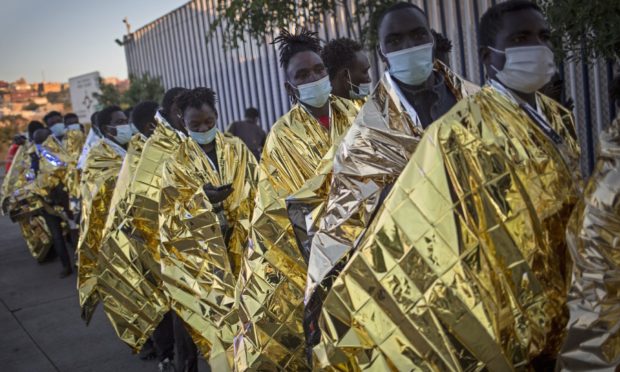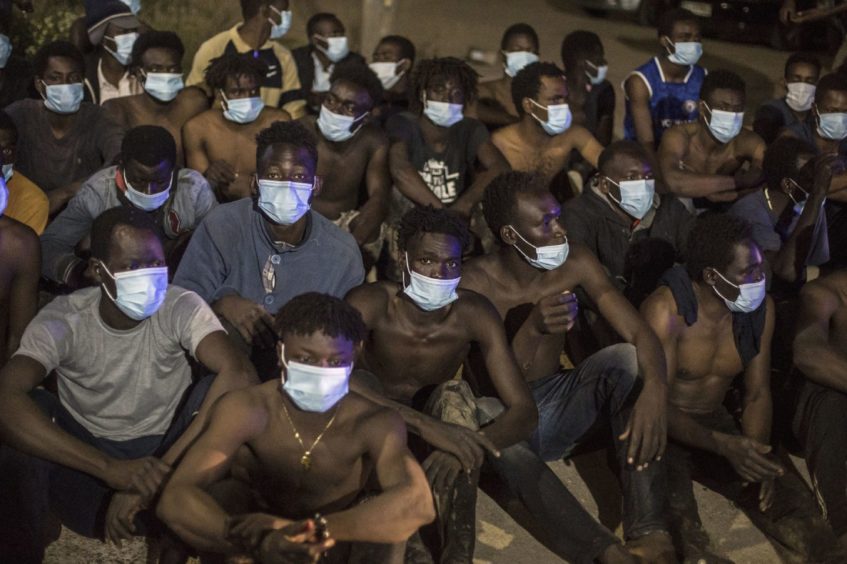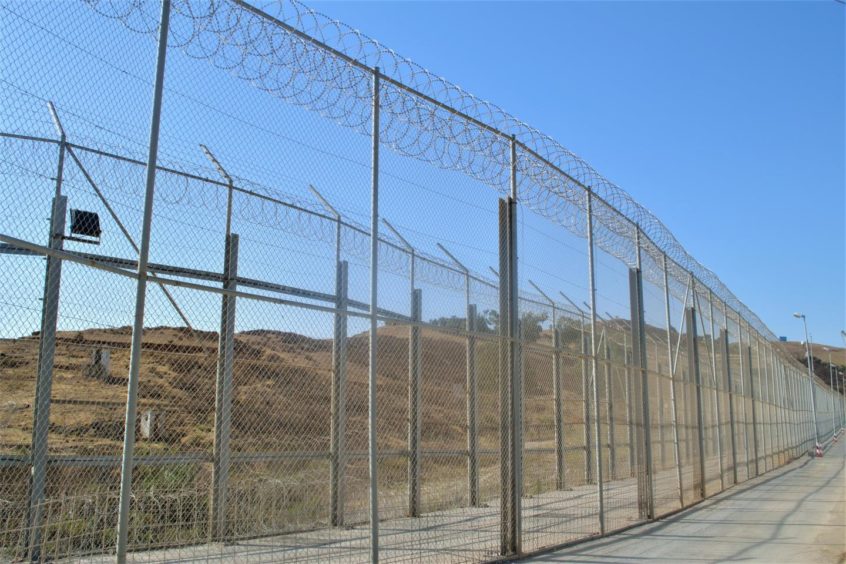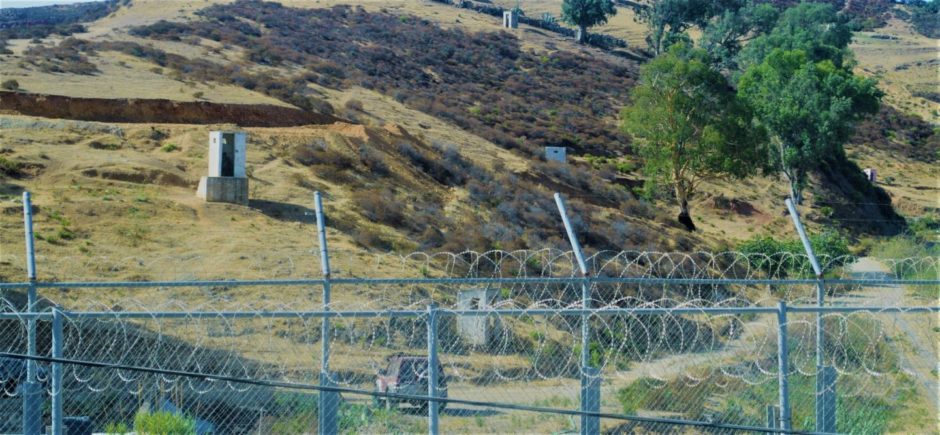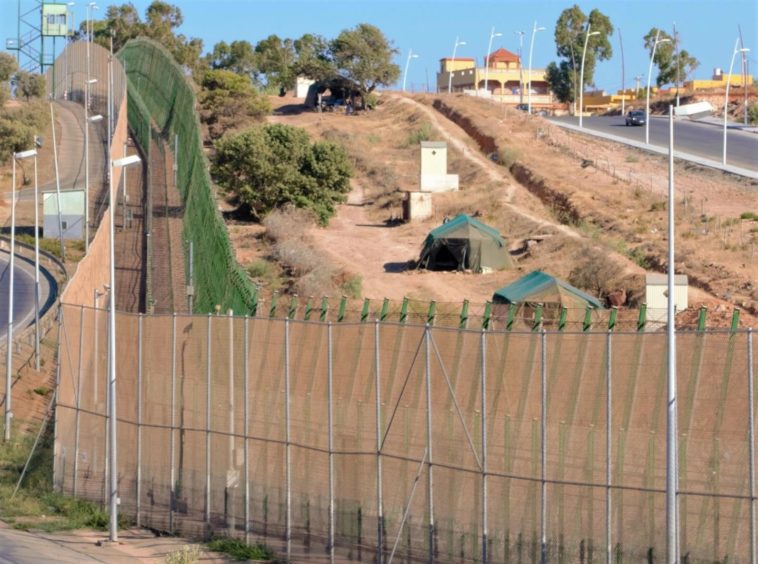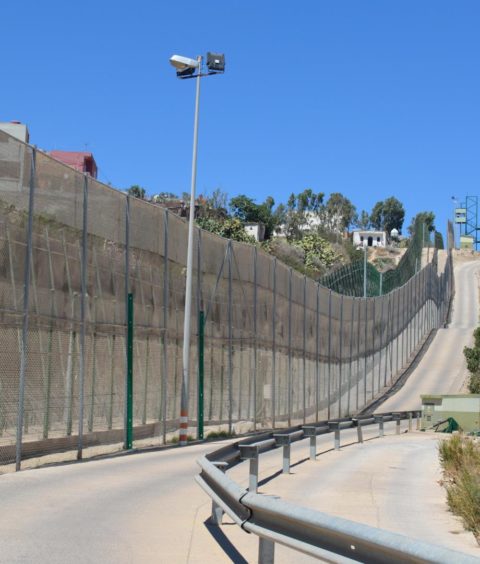Situated on the northern coast of Africa are the Spanish enclaves of Ceuta and Melilla. These are the EU’s final frontier when it comes to immigration.
Surrounded by metres-high razor-wire fences, the authorities have for many years struggled to hold back the ever-growing tide of refugees or economic migrants from fleeing sub-Saharan Africa. Desperate for a better life, people will do anything to get in, while the Spanish try everything to keep them out.
Held by Spain since the 17th Century, these pockets of land are naturally disputed by Morocco. However, just across the water, on mainland Europe, stands the Rock of Gibraltar. British territory for over 300 years, which the Spanish of course do not accept.
Double standards here? Possibly…
What prompted me to write about this again, was last week, when in one day, an unprecedented 6,000 people, mostly young single men, made it into Ceuta. Not by climbing dangerous fences, but by simply swimming from Morocco.
Believe me, the Spanish enclaves are struggling to cope. The population of Ceuta is roughly 85,000. Spain has called in the army, and most of the single men who swam in were rounded up and quickly sent back. I’m not altogether sure what happened to the unaccompanied minors.
A couple of years back, I spent a week in Ceuta, photographing at will, before taking a 400-kilometre ride in a 30-year-old taxi down through the African coast to Melilla. It was one of the most spectacular trips of my life.
While Ceuta feels like old colonial Spain in style, Melilla is much more Arabic.
I visited the area around the Ceti refugee camp in Melilla. Not pleasant.
I walked the border fences for days on the Spanish side. Here I was, in the continent of Africa, yet standing on Spanish soil. Over a set of razor-wire fences was Morocco. Two continents, Europe and Africa, on the map separated by sea, yet here, only feet apart. It was hard to get my head around.
I interviewed the Guardia Civil chief press officer. Shattered after another night of hundreds storming the fences, he told me: “There are thousands of them just waiting in the Moroccan countryside. More and more are coming all the time.”
By a chance meeting, I managed to bag a full-length interview with a young man – let’s call him David – who successfully made it over the fences, and was allowed to stay. His story was remarkable. After many failed attempts, and travelling through numerous countries, even sleeping in deserts in Algeria, he finally made it to the Moroccan/Melilla border.
Here is an extract of what he told me.
“On the Moroccan side, the police used batons, stones, bottles, sticks, anything they could lay their hands on, to injure us and try to stop us. They would even drive their cars into us.”
“On the night that you actually made it over, how many of you were running at the fences?” I asked him.
“We were four, maybe five hundred. We woke at 3am and made our move. Then we hear police helicopters, flying in front of us and shining lights on to us, lights everywhere. Some people wanted to abort, but I kept running telling myself, one spirit, one soul, one body, one mind.”
I tried to imagine the scene: hundreds of terrified people, running in the dark towards huge razor-wire fences while helicopter lights rained down on them. David continued:
“First, before you get to the fence, the Moroccans put razor wire on the ground, so in the dark, you run into it with your feet. This is what gets so many people, their feet get cut badly, and the hands and the body, some fall on their faces. As we climb the first fence, the Moroccan police are throwing stones at us to make us fall down.”
I asked: “Once you are over the first fence, do you feel safe?”
David replied: “Oh no, you only are in no-man’s land. There is a middle fence that you must get over, then over the third fence and only then are you in Spain. We always hope that there are journalists there, it helps the Spanish Guardia to take us in and not to put us back to the Moroccan side. Often the Red Cross are there and help us.”
“So, you’ve made it past the stone-throwing Moroccan police and over the inner fence, now you’re climbing the third fence and obviously, the Spanish Guardia are standing watching you. What’s their attitude?” I continued.
“The Guardia do not fight us back; they are ready to accept us if we can make it.”
This fascinated me. “Let me get this straight, the Guardia don’t try to stop you and, in fact, help you?”
David replied: “Of course, they build the fences to stop us, but, if we make it over, they welcome you.”
As I mentioned, Spain does everything it can to prevent people coming in, yet for those who do make it over the fences, the Guardia help them. I have read much criticism about the way those who make it over are treated once they land in Ceuta or Melilla, and, while I have no doubt that incidents have happened in the past, there is always another side to the story.
I have it on authority from many sources that the Guardia do in fact help those who make it over the fences and often provide medical aid if they are injured. While I was in Melilla, one migrant was seriously injured atop the inner fence. He was bleeding to death. However, a quick-thinking Guardia officer saved his life.
This, of course, is all regarding fences, and not what took place with entry by sea last week.
“What happened next?” I asked David.
“We were taken to Ceti refugee camp, the Red Cross were also there and treated anyone with injuries.”
I asked him: “There are many nationalists in the camp, are there ever any troubles, any fighting?”
He replied: “There are people from Sudan, Somalia, Syria, Cameroon, Lebanon, Algeria, Niger, Chad, Senegal, Gambia, Liberia, Sierra Leone. No fighting amongst different peoples but… well, the Syrians… they’re always fighting amongst themselves.”
During my time in Melilla, I learned that while many refugees like David make their own journey north through Africa, criminal gangs are also in on the act. Human rights activists claim that many people are brought to Morocco from countries across the continent by smugglers who charge as much as they can get away with. It seems that wherever there is a human tragedy, there is always another human just waiting to cash in.
Many conclude that the solution is to build the fences even higher and make them more complex or dangerous in order to deter. But where does it all end?
Mass illegal immigration will only end when poor, corrupt, war-torn and unstable African dictatorships become peaceful democracies. It will only end when people do not want to flee from their own countries.
You may have noticed I’ve used different words/phrases to describe those attempting to make it to another land: refugees, migrants, economic migrants. It is not laziness on my part, there is a reason for it. These words have quite different meanings and the people who make this journey are doing it for numerous reasons. Therefore, I feel it is not up to me to say under which category they fall. In addition, just to confuse matters, add in the term “asylum seeker”.
It has to be said though, on being interviewed, many of the “migrants” to Ceuta have admitted that their journey was for economic reasons and not to flee persecution.
Firstly, Morocco needs to do more. It has huge borders with Algeria to the south and needs to plug the gaps. But how far back do you go? Maybe Algeria should do more with its borders with Libya, Niger and Mali, then they in turn do likewise with Chad and Sudan and so on and so on. However, poorer countries have fewer resources and often less desire to sort this out.
The official line from Morocco is that they are doing all they can. However, I question why Morocco would want to stop people fleeing, it just does not make sense. Once they cross these fences then they are officially in Europe, it’s not Morocco’s problem any more. It can wipe its hands and leave it to Europe.
I’ve also seen disturbing video footage of a Moroccan border guard opening a gate and waving migrants through towards Spanish territory. He is actively encouraging them.
With 6,000 making it into Spanish Ceuta in one day alone, it’s clear to me that the Guardia are fighting a battle that, in the long term, they simply cannot win. And it’s only going to get more intense as civil war, famine, disease, economic woes and political oppression continue unabated in Africa.
I’ll go a step further.
The EU is fighting battle with mass uncontrolled immigration it cannot win either.
